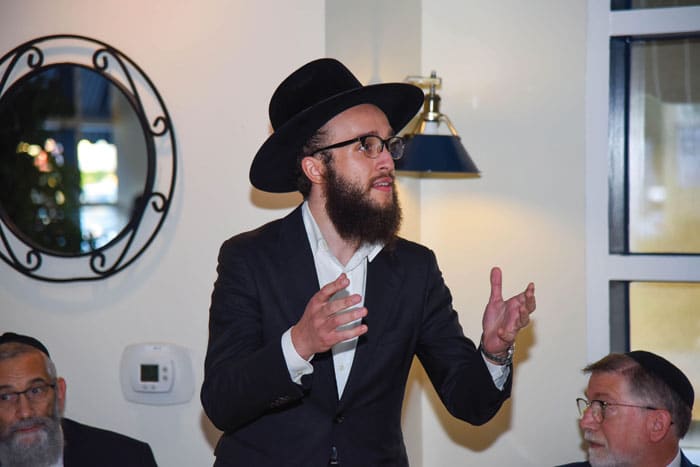
Early on a typically noisy, traffic-heavy weekday afternoon along Pico Boulevard, one scene was certain to go unnoticed, as intended. Up a steep set of stairs to the second floor of a large yellow building, around a corner and inside a small office sat a scion of an illustrious Moroccan dynasty, the Pinto family, dating back more than a thousand years.
The youthful Rabbi Moshe Pinto was at his desk learning Torah. He is soft-spoken and talks exclusively in the plural, never the self-referential “I.” He opened the Moroccan congregation Beit El at 8660 West Pico Blvd less than a year ago; it is four blocks west of the Pinto Center, founded by his revered father, Rabbi Yaacov Pinto, in 1984.
Around 2017, after six years of learning in Israeli yeshivas, the younger Pinto had a career decision to make.
“Our work really started in Eretz Israel,” he said. “We were about to sign a lease, and our father called us in Ashdod. He said, ‘Look, you are going to have to make a decision whether or not you stay in Eretz Israel.”
It seemed a difficult call for Pinto because “we had hundreds of people coming to our classes,” he said. “There is a different mentality in Israel. Almost every shul has one day of the week when it holds a big class. It is common, not something extra.
“Only in Los Angeles,” Pinto said, “did we find that it is not common for people to have this motivation to all come together in the middle of the week for a class. This exists almost all around the world, but especially in Eretz Israel.”
His father explained to him the need for learning in L.A.
“Our father said, ‘Where do you want to put your work? In Israel, people are coming to your classes… There is a lot of work here, a lot of potential.’”
— Rabbi Moshe Pinto
“Our father said, ‘Where do you want to put your work? In Israel, people are coming to your classes. If you leave, they will go to someone else’s classes.
“‘Here,’ our father said, ‘there are no classes. There is a lot of work here, a lot of potential, potential to make changes in people’s lives that doesn’t exist anywhere else.’ So that is why we came here in the first place.”
When the rabbi arrived in L.A. four years ago, he gave classes in homes and his father’s shul. “That was very successful,” he said. “We had this dream: to build a community, like a shul, a yeshiva, a school, where people would be able to live the way they live in Panama. In Panama, there is community. In Mexico, also, there is community, where they pray together, their kids go to school together, they have dinner together, they go to events together. Everything together. Here, this does not exist. School is separate from the shul, [and] the shul is separate from the kollel.”
The younger Pinto spent almost two years leading the Baba Sali community in the Fairfax district.
“Then the corona came,” he said. That’s when Pinto started Beit El. It has already outgrown its quarters, a room with high ceilings and long tables. The shul has a daily kollel that’s in its beginning stages, and there are two to four daily classes. While some are mixed, most classes are for men only.
Shabbat services are the main attraction, and crowds have been hefty. “The number varies because we are a very young community,” Pinto said.
There aren’t many older congregants because the synagogue is on an upper floor. Also, there isn’t a kids’ program, so families aren’t coming.
“Our congregants generally are between 25 and 39, mostly couples,” he said. “A bad week would be 90 people here for Shabbat, a good week 180. But the size of the turnout depends. When we have an event, we could draw 300 people. The reality is we outgrew this room.”
He continued, “That is why we also are looking to move. To move or to acquire.”






















 More news and opinions than at a Shabbat dinner, right in your inbox.
More news and opinions than at a Shabbat dinner, right in your inbox.